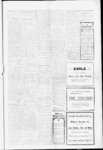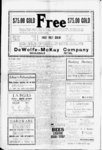Beaver County News | 1909-11-19 | Page 3
| Type | issue |
| Date | 1909-11-19 |
| Paper | Beaver County News |
| Language | eng |
| City | Milford |
| County | Beaver |
| Rights | No Copyright - United States (NoC-US) |
| Publisher | Digitized by J. Willard Marriott Library, University of Utah |
| ARK | ark:/87278/s64v29nc |
| Reference URL | https://newspapers.lib.utah.edu/ark:/87278/s64v29nc |
Page Metadata
| Type | page |
| Date | 1909-11-19 |
| Paper | Beaver County News |
| Language | eng |
| City | Milford |
| County | Beaver |
| Page | 3 |
| Reference URL | https://newspapers.lib.utah.edu/ark:/87278/s64v29nc/29677449 |










